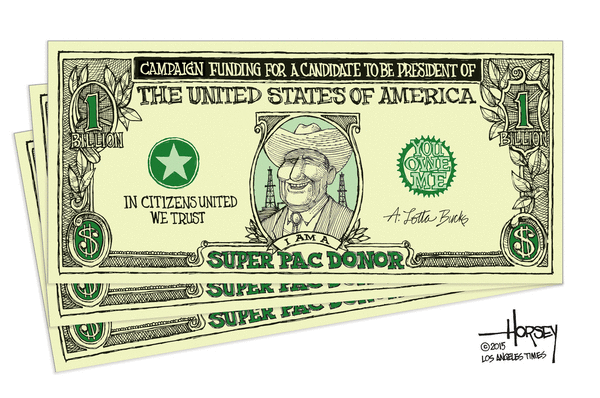Hillary Clinton’s fundraising haul: $28 million for the quarter
By the numbers
Welcome to Trail Guide, your daily host through the wilds of the 2016 presidential campaign. It's Wednesday, Sept. 30, and this is what we're watching:
- Hillary Rodham Clinton's campaign says it raised $28 million this quarter; Bernie Sanders is at $24 milion
- The latest batch of emails from Clinton's tenure at the State Department are out
- Kevin McCarthy ties the Benghazi investigation to Clinton's poll numbers, Clinton fires back
- By targeting minorities , are Donald Trump and Ben Carson driving voters from the GOP?
- Bill Clinton is ready for campaign duty
Who are the millionaires bankrolling the 2016 presidential race?
With the campaigns tallying up their latest fundraising hauls tonight as the year's third quarter draws to a close, now is a good time to review the data that make this election truly unique.
For three decades, federal laws restrained how much money rich people could pour into presidential campaigns. No more, thanks to a series of recent court decisions.
Click over to our new interactive graphic to dig into the long list of millionaires who have written six-figure checks to outside groups that can now take unlimited donations.
New batch of Clinton's emails shows her cautiousness on gay rights
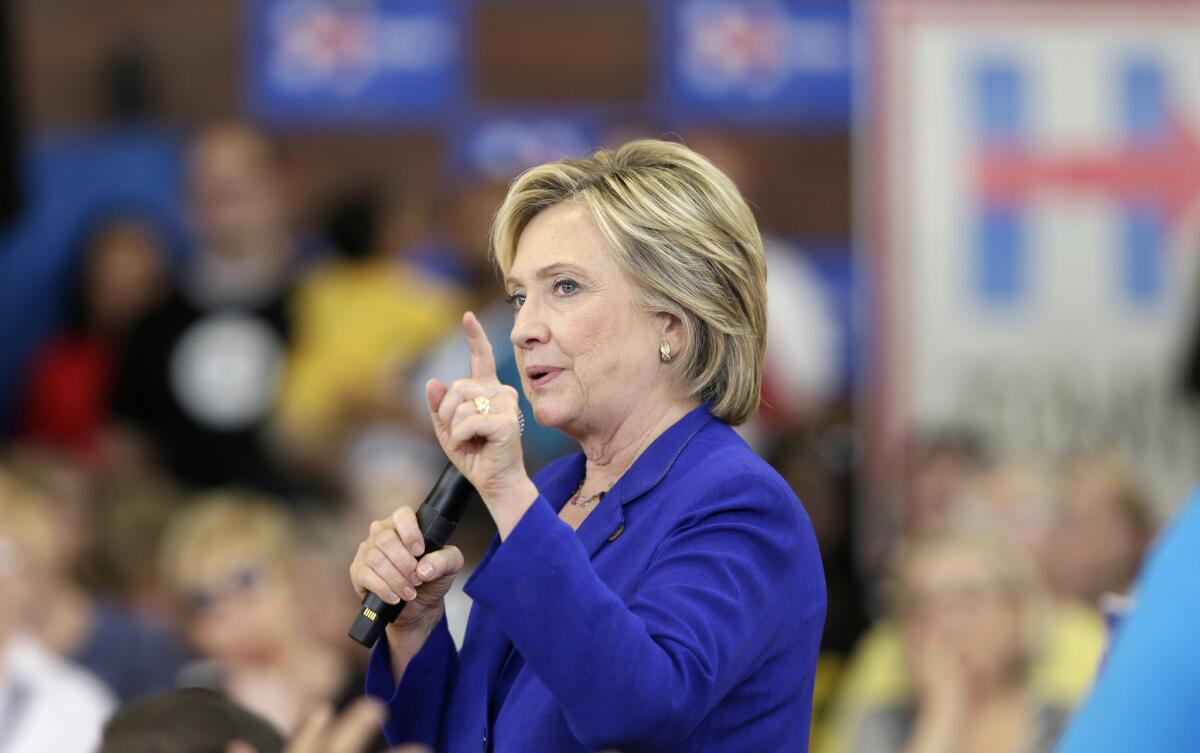
Democratic presidential candidate Hillary Rodham Clinton speaks in Des Moines last week. Another group of private emails from her tenure as secretary of State has been released.
Hillary Rodham Clinton has lately positioned herself on the forefront of gay rights, but tucked into a newly disclosed batch of her emails is a reminder that she had long taken a more cautious approach to the issue.
While secretary of State, Clinton personally intervened in early 2011 to reverse a policy change at the State Department that had been a symbolic gesture to nontraditional families, the messages show. She fretted that the change would give fodder to Fox News to attack her.
Hillary Clinton raises $28 million in quarter, with Bernie Sanders close behind
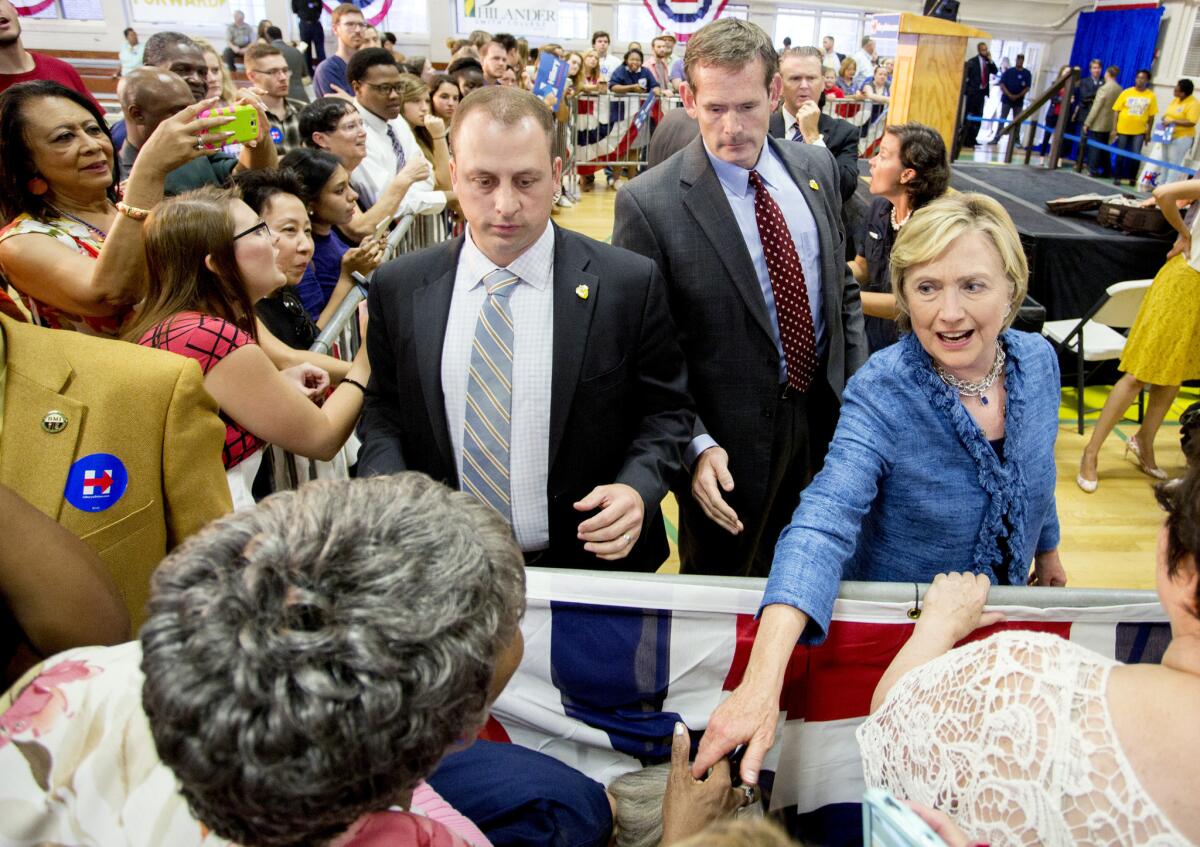
Democratic presidential candidate Hillary Rodham Clinton greets poeple at a grassroots organizing meeting at Philander Smith College Monday, Sept. 21, 2015, in Little Rock, Ark. (AP Photo/Gareth Patterson)
Hillary Rodham Clinton's blitz of fundraisers over the last three months, during which she personally headlined 58 events that took her to Hollywood mansions, New York City lofts, Iowa living rooms and many venues in between, has paid off handsomely.
Her team said she has added at least $28 million to her official campaign in the quarter that ended Wednesday. It's the most money that a non-incumbent has ever raised before his or her third quarter of campaigning.
------------
FOR THE RECORD
6:30 p.m.: A previous headline on this post incorrectly said Clinton raised $25 million in the quarter.
------------
But also notable is how close rival Bernie Sanders, the self-described socialist senator from Vermont, came in matching Clinton's haul. Sanders, an independent seeking the Democratic nomination, reported that he raised $24 million, fueled by a torrent of small donations online.
One measure that is not reflected in the numbers, though, is the cache of funds that Clinton supporters have in their arsenal in the form of super PAC money. Priorities USA, the main super PAC supporting Clinton, raised about $25 million since July 1. In total, Clinton's official campaign and super PAC together have raised $115 million since she announced her candidacy in April.
It is a formidable amount. Sanders has vowed not to raise money through super PACs, which he says are corrupting democracy.
Sanders' campaign said it had about $25 million on hand thanks to more than 1 million donations from about 650,000 contributors. Last quarter, Sanders raised $15.2 million, compared with the $47.5 million raised by Clinton's campaign.
The take-away from the latest figures is twofold. First, they suggest Sanders is not fading away any time soon. But the impressive hauls also pose a challenge for another potential Clinton primary rival, the one who hasn't even entered the race.
Should Vice President Joe Biden decide to run, he will have a lot of fundraising ground to make up quickly.
Clinton's team, though, wants voters to know a few other things. Aides emphasize that most of the checks did not come from a select group of deep-pocketed donors (although the super PAC funds did). Although it can't match Sanders' small-donor network, the Clinton campaign is boasting that 93% of the most recent quarter's donations were under $100. It is not yet saying how many donors there were, information that will be in the official report filed in October.
So the scores of emails the campaign sent out begging people on their email list to give just $1 were not entirely ignored.
Staff writer Sarah Parvini contributed to this report.
Ben Carson's campaign raises at least $20 million
Earlier, Republican presidential candidate Ben Carson's campaign said donations in September would nearly double the amount from the previous month. Carson has been building a strong grass-roots base, and his campaign has close to 600,000 donations from more than 352,000 people.
Clinton fires back at McCarthy's comments on Benghazi panel
Hillary Rodham Clinton is firing back at Republican Rep. Kevin McCarthy's comments about the House investigation of the 2012 attacks in Benghazi, Libya.
McCarthy, who is favored to become the leader of the House when Speaker John A. Boehner steps down at the end of month, tied Clinton's poll numbers to the Benghazi investigation in an interview with Fox News on Tuesday.
He said her "numbers are dropping" because "she's untrustable."
On Wednesday, Clinton told MSNBC the remarks were "deeply distressing," adding that she knew Ambassador J. Christopher Stevens, one of the four Americans who died in the Benghazi attack.
"When I hear a statement like that, which demonstrates unequivocally that this was always meant to be a partisan political exercise, I feel like it does a grave disservice and dishonors not just the memory of the four that we lost, but of everybody who has served our country," she said.
More Clinton emails released: 'Can you pls tell me how many times I voted against raising the debt limit?'
The State Department released another batch of Hillary Rodham Clinton's emails Wednesday afternoon.
In them, Clinton fretted about speaking with a White House operator, being called Hillary "Robin Hood" Clinton and flight delays.
You can read them here.
CNBC's criteria for October GOP debate narrows the field
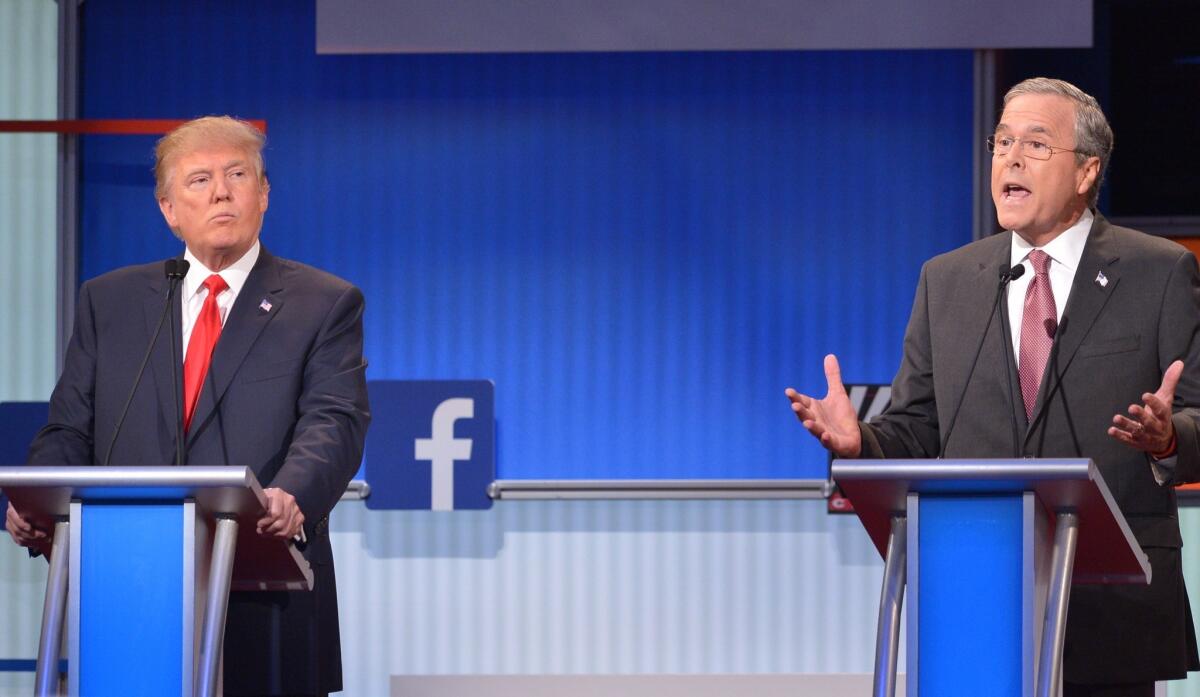
Donald Trump, left, and Jeb Bush, pictured at the first Republican presidential primary debate on Aug. 6 in Cleveland, will face off with other GOP contenders Wednesday at the Ronald Reagan Presidential Library in Simi Valley.
The next Republican presidential debate seems likely to have a smaller cast.
CNBC, which is scheduled to host the debate in Boulder, Colo., on Oct. 28, announced selection criteria Wednesday that are designed to narrow the field.
In order to appear in the 8 p.m. debate, candidates will need an average of at least 2.5% support in a small group of national polls released between Sept. 17 and Oct. 21. The polls that will be considered will be those by NBC, ABC, CBS, Fox, CNN and Bloomberg.
Those who do not make the cut, but get at least 1% in the polls, will be invited to an earlier debate at 6 p.m. Some GOP spokesmen had previously suggested there would not be an undercard debate.
Based on an average of the four polls so far that meet CNBC's criteria, the main debate would feature nine candidates: Donald Trump and Ben Carson, who are currently the two leading contenders, followed by Carly Fiorina, Sen. Marco Rubio of Florida, former Gov. Jeb Bush of Florida, Sen. Ted Cruz of Texas, Gov. Chris Christie of New Jersey, Gov. John Kasich of Ohio and former Gov. Mike Huckabee of Arkansas.
Sen. Rand Paul of Kentucky is at risk of dropping to the undercard debate, where he would join Gov. Bobby Jindal of Louisiana and former Sen. Rick Santorum of Pennsylvania. Former New York Gov. George Pataki and Sen. Lindsey Graham of South Carolina are currently below the 1% threshold to participate in either event.
The debate will be moderated by CNBC anchors John Harwood, Becky Quick and Carl Quintanilla.
Another countdown clock is ticking in the Biden watch
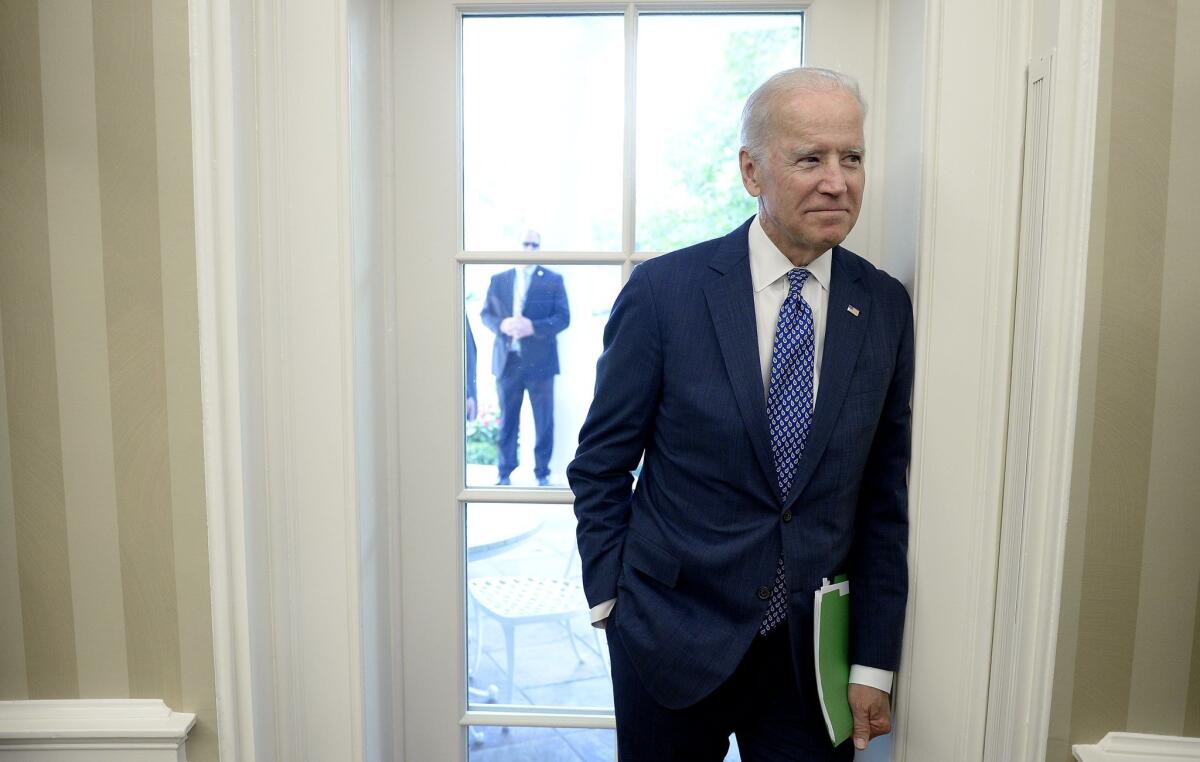
Vice President Joe Biden attends a bilateral meeting in the Oval Office between President Obama and King Salman of Saudi Arabia on Sept. 4, 2015.
Vice President Joe Biden has 51 days to decide on a presidential bid -- that is, if he wants to appear on the New Hampshire primary ballot.
The filing period for candidates who wish to contest the nation's first presidential primary will begin Nov. 4 and remain open until 5 p.m. on Nov. 20, New Hampshire Secretary of State Bill Gardner announced Wednesday.
Qualifying for the ballot is intentionally easy, as state tradition demands -- a candidate or a representative simply needs to submit a completed declaration of candidacy form and provide the filing fee of $1,000, in cash or certified check. Any candidate who hasn't filed by Nov. 20 must appear in person to do so, however.
Thirty Republicans and 14 Democrats qualified for the primary ballot in 2012. Most candidates choose to file in person, visiting the State House in Concord to file paperwork on a historic desk -- the secretary of state's office brings it in for the purpose -- as well as rallying nearby with supporters.
The date of the presidential primary itself has not been set yet. State law gives Gardner unique power to set the date as he sees fit, ensuring that it comes seven days before any "similar election." But unlike in past presidential cycles, there are few states seeking to usurp New Hampshire's preeminent status, and the contest is widely expected to fall on Feb. 9.
2016 marks a century since New Hampshire's first presidential primary. 2020 will be 100 years since it was first the first presidential primary in the nation.
The filing period this year is the latest since 2003, when it closed on Nov. 21.
Biden is expected to decide on a presidential run as soon as this month, though some close to the vice president have suggested he could wait the process out until as late as early next year.
Biden himself recently told a Catholic magazine it was a "family decision." "It may not get there in time to make it feasible to be able to run and succeed because there are certain windows that will close," he said.
The filing process is not unfamiliar for Biden. In 2011, he went to Concord on behalf of the ticket to submit the president's name for the ballot, four years after doing so for his own candidacy.
Christie Hefner suggests Biden sit out the race
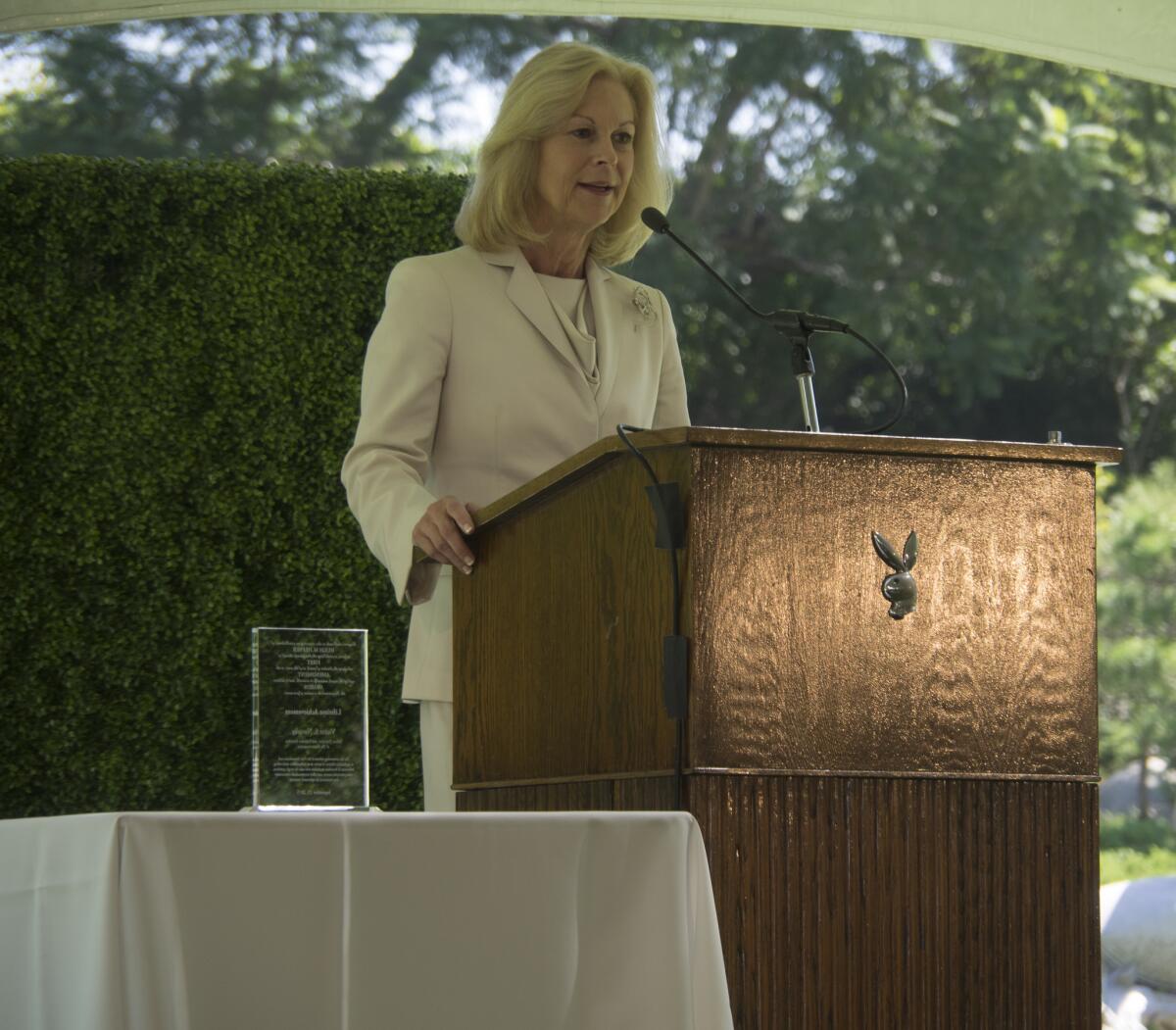
Christie Hefner speaks at the Hugh M. Hefner First Amendment Awards at the Playboy Mansion in Beverly Hills on Sept. 29, 2015.
Christie Hefner has some advice for Vice President Joe Biden: Don't do it.
Hefner, daughter of Hugh Hefner, the magazine magnate and former chairman and chief executive of Playboy Enterprises, took a moment to play pundit Tuesday.
"I would not like the last chapter of his political biography to be that he ran against Hillary Clinton in the primaries because I don't think he would win and I think it would be sad," Hefner said in an interview with the Times after the Hugh M. Hefner First Amendment Awards. They were hosted under a tent at the Playboy Mansion on a sunny and warm morning.
Hefner suggested the "best thing" for Biden, openly contemplating a third bid for the presidency, would be to not actually enter the primaries and run against Hillary Rodham Clinton. Instead, Hefner said -- noting that she admires and likes the vice president -- she thinks he should "let it be known to the superdelegates and to donors and to activists that if something were to happen that were to so wound Hillary's prospects, that even at the eleventh hour at a brokered convention, he would be there."
She predicted Clinton ultimately will be the Democratic nominee. Even though she has not officially picked sides or contributed, Hefner said she "wouldn't have any problem saying that I'm going to vote for her." (Hefner supported Barack Obama in 2008 and 2012.)
"I believe that she would be and perhaps will be a good president, but she is one of those people who is not a good candidate," Hefner said, citing as shortcomings Clinton's "penchant for secrecy" and a sense of "guardedness" that make it harder for the former secretary of State to connect with voters.
Hefner does not know Sen. Bernie Sanders but said, "I like that he's running, I like what he's talking about." She said addressing income inequality, defining it as the hollowing out of the middle class and the lack of a path for generational economic advancement, is a moral imperative and the overarching issue of the next election.
For more from our political team, sign up for the Essential Politics newsletter
McCarthy makes plain what Democrats have long suspected about the Benghazi committee
Republican Rep. Kevin McCarthy has yet to win the speaker's gavel, but he is already stepping into a rhetorical minefield that shows the perils of the job.
McCarthy, the no. 2 House Republican, who is favored to become the top leader in Congress after Speaker John A. Boehner steps down at the end of month, gave an interview Tuesday night to Fox News in which he seemed to concede a key Democratic talking point: that the GOP investigation into the 2012 attacks in Benghazi, Libya, is all about politics.
"Everybody thought Hillary Clinton was unbeatable, right?" said McCarthy, of Bakersfield. "But we put together a Benghazi special committee. A select committee. What are her numbers today? Her numbers are dropping. Why? Because she's untrustable. But no one would have known that any of that had happened had we not fought to make that happen."
Republicans have long insisted that the committee was established to try to get the truth behind the deaths in Benghazi of four Americans, including the ambassador to Libya, and not muddy up Clinton, the secretary of State at the time and the Democrats' likely 2016 presidential nominee. Any damage inflicted on Clinton was incidental, they insisted. It was Democrats who have called the committee a political witch hunt.
Opponents feasted on McCarthy's comments.
Rep. Adam Schiff, the Burbank Democrat who is one of the party's top voices on intelligence matters, called McCarthy's statement a blunt admission that the committee's "true purpose had little to do with finding out anything new of that tragic night that claimed four American lives, and everything to do with attacking a likely Democratic nominee for president."
"McCarthy laid bare the abusive purpose of this taxpayer-funded committee," he added.
The pro-Clinton super PAC Correct the Record piled on, calling McCarthy's admission "disgraceful."
McCarthy, who in his fifth term would be the least experienced member of Congress in more than a century to lead the House, surely knows how treacherous the task will be. He has held the No. 2 job for more than a year. But there's nothing like seeing the bright lights firsthand.
He's trying to show insurgent conservatives that he's willing to fight hard for their principles. At the same time, he is facing scrutiny from a broader American audience as he tries to show that his party can govern, despite the intraparty feuds that led to congressional paralysis and the resignation of Boehner, effective Oct. 30.
McCarthy has been using the Benghazi committee as an example that he can lead "a conservative Congress, that puts a strategy to fight and win." In that vein, he has also highlighted a GOP plan to enlist a committee to scrutinize Planned Parenthood, rather than risk a government shutdown by trying to strip the organization of its funding as some conservatives have demanded.
But as Boehner can attest, it's a tough balancing act. In the same interview, McCarthy was asked to grade Boehner's performance. It was the ultimate test of the stress he is facing: McCarthy served alongside Boehner as his top deputy, but the conservatives who pushed Boehner to resign have lambasted him as a squish.
McCarthy's grade for Boehner? B-minus.
Yikes, no wonder Boehner is heading for the exit.
A day for candidates to beg, not just for votes
It's a day for desperate-sounding emails from presidential candidates, as they scramble for last-minute donations before the books close tonight on another fundraising quarter. For White House hopefuls, particularly those lagging in the polls, putting up respectable numbers is important to show momentum and a strong surge of support.
Jeb Bush piled up a huge money lead to open his campaign, thanks mostly to a $103-million haul by a pro-Bush super PAC, but it hasn't stopped him from drifting downward in the polls.
"Being president will test you to your core. ... And I can assure you, Jeb is ready for that big challenge," said an email signed by his dad, former President George H.W. Bush. "That's why I'm asking you to get behind him today with a gift of $100, $50 or $25."
And even the largest super PAC accounts can't prop up a fading campaign; Scott Walker and Rick Perry had to drop out when they burned through their campaign cash, even though their super PACS still had millions. Bush closed out the quarter with a last-minute push for contributions, attending fundraisers in St. Louis on Monday and Oklahoma on Tuesday.
For Ben Carson, the neurologist who's now running at or near the top of the field in polls, money has been coming in at a faster clip, according to campaign spokesman Ben Watts. He said donations in September will top $10 million, close to double the month before. Watts said the campaign has also been building a strong grass-roots base, and has close to 600,000 donations already from more than 352,000 people.
"We have a great number of people who say they've never given money before," he said.
Carson's Sept. 20 comment that he did not think a Muslim should be president boosted his fundraising take in the next days by about a third, Watts said.
On the Democratic side, Vermont Sen. Bernie Sanders also is hoping to make a statement with a huge number of donors: he has sent out emails hoping to push past 1 million donations by the deadline.
Candidates must file their fundraising reports by Oct. 15.
By targeting minorities, are Carson and Trump driving voters from the GOP?
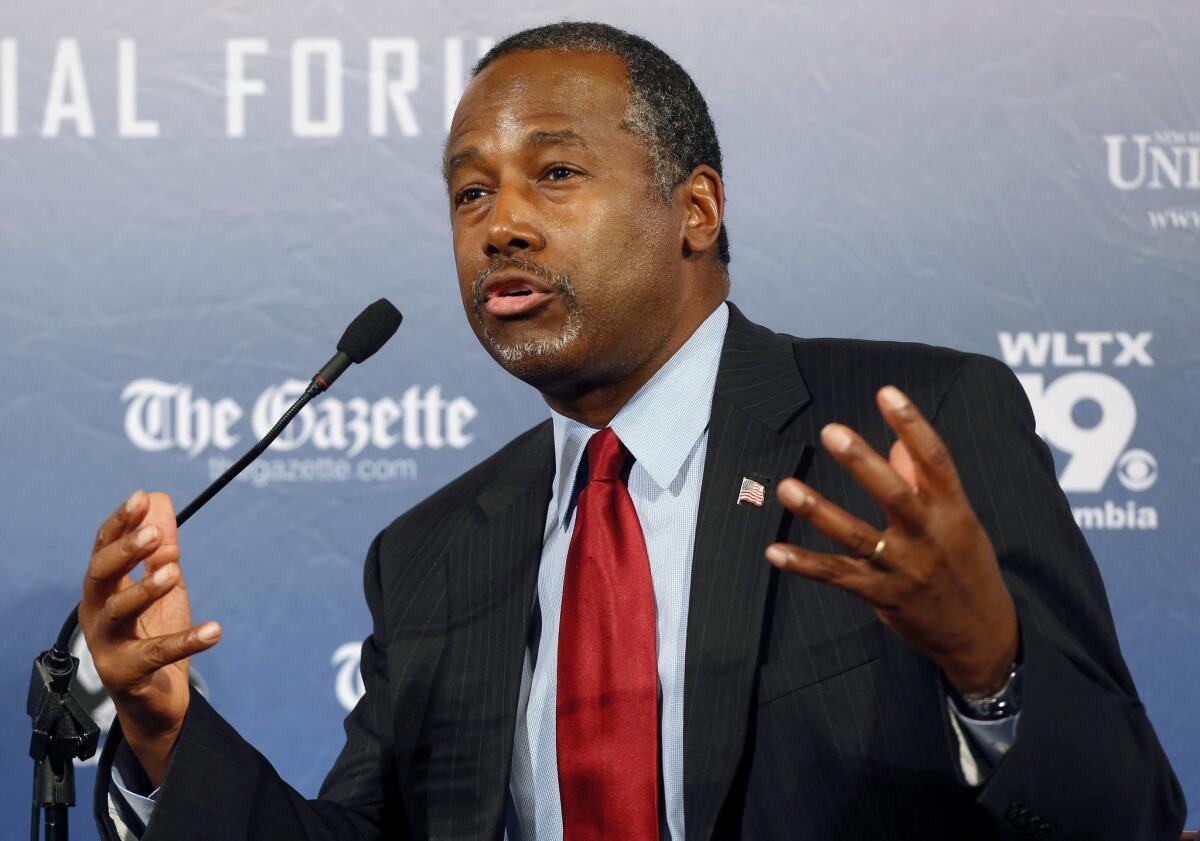
Republican presidential candidate Ben Carson, a devout Christian, said in a recent interview that Islam is antithetical to the Constitution and he doesn’t believe that a Muslim should be elected president. Above, Carson speaking in New Hampshire in August.
It's a delicate task for presidential candidates to benefit from voters' racial or religious prejudice.
In recent decades, Republican Ronald Reagan set the standard, when he opened his 1980 general election campaign against Democratic incumbent Jimmy Carter in Philadelphia, Miss., a town best known for the 1964 murder of three civil rights activists.
It was an era when the GOP was overtaking the Democratic Party as the dominant party in the South, largely as a result of a white backlash against civil rights laws passed in the 1960s.
Ignoring the advice of his pollster Richard Wirthlin, who urged him to avoid such a racially charged setting, Reagan told the Mississippi crowd that he was a believer in "states' rights," a concept that Southern politicians had used for generations to preserve slavery and segregation.
Reagan bemoaned "the great tragedies of welfare," saying public aid "should be turned back to the states."
It was a textbook case of a White House hopeful using coded language.
But times have changed. Republican presidential candidate Ben Carson dispensed with "dog whistle" politics last week and openly stated his bias against Muslims on NBC's "Meet the Press."
"I would not advocate that we put a Muslim in charge of this nation," the retired neurosurgeon said. "I absolutely would not agree with that."
Carson's remarks highlighted the recent coarsening of public discourse in "a different kind of world where people take in stride the strident, racist things that are said," said Norman Ornstein, coauthor of "It's Even Worse Than It Looks: How the American Constitutional System Collided With the New Politics of Extremism."
"I think it's part of the Internet age, but also a media world where there are so many outlets, and so many voices, and so much cacophony, that to cut through you need shock value," Ornstein said.
By the numbers
Sign up for Essential California
The most important California stories and recommendations in your inbox every morning.
You may occasionally receive promotional content from the Los Angeles Times.
